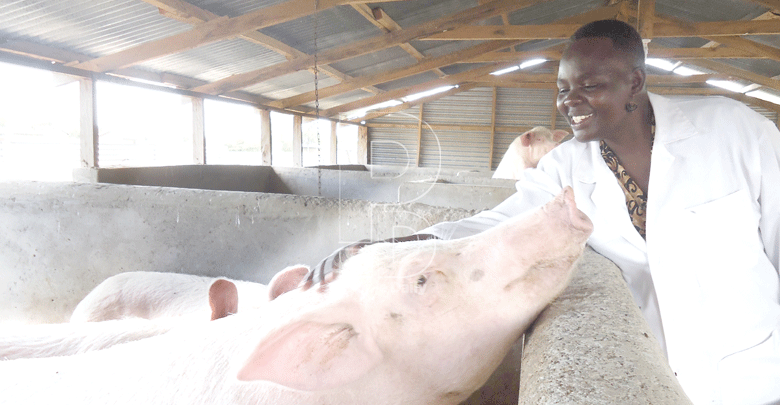Green Farm: Pigs bring home the bacon for Kisumu farmer

A narrow murram road stretching-off the Kisumu-Nairobi highway leads to Green Farm. The enterprise is co-owned by Christine and her husband Patrick Otaa who have perfected the art of keeping pigs. Agribiz visited the farm located at Morlem area on the outskirts of Kisumu town and learnt their secrets in rearing pigs.
This farm is subdivided into different sections comprising maternity (farrowing rooms), holding area, service unit and winners units, each with its defined purposes. All the pens are occupied by pigs ranging from two months to mature ones.
“We had different ideas in mind such as dairy and fish before settling on pigs rearing which we found profiting and easy to manage,” recalls Christine.
She says at roughly 10 weeks old, the mother pigs (sows) are separated from piglets and released for continual breeding. The baby pigs are then transferred to the growers’ segment when they reach 10-12 weeks old. On average, a piglet takes about eight months to mature.
Female pigs yet to breed are moved to the service pen when they start showing signs of being on heat and later to the maternity unit a few weeks before farrowing (giving birth). “For purposes of healthy and fast growth, we have a stipulated feeding timetable. As a routine, we feed the stock twice a day, at 8am and 6pm,” she says.
Commercial feeds
The quantity and type of feeds given to the stock varies depending on the size. At Otaa Green Farm, weaners (6-8 weeks old piglets) are given pig’s starter feed. Growers (10-12 weeks old) eat growers variety while mature stock are fed on sower feeds. The weaners can eat 200g per piglet daily, which is increased gradually.
On the other hand, the mature pigs consume one bag of 70kg everyday. “We prefer using commercial feeds, which proportionally has a higher mixture of proteins, vitamins, carbohydrates and minerals. Plenty of water should also be availed for the pigs,” says Christine.
Though pigs are hardly attacked by diseases, high standards of hygiene must be observed. “We spray our pigs with special pesticides every two weeks to keep them healthy,” she says.
On reaching maturity, the farm slaughters boars at a prime weight of 50-70 kg while the females are kept for breeding purposes. “We sell the pork in our own butchery and also supply to a contracted local supermarket. A kilo goes for averagely Sh300,” says Christine.
The supermarket orders about 150kg after every two weeks, earning the farm Sh45, 000 per delivery. “On a good month, the farm makes at least Sh100, 000 from selling pork. The market is available since demand is rising,” she says.
The family ventured into pig rearing two years ago, starting with two mature pigs purchased at a cost Sh70,000 from Sumba Pig Farm in Kakamega county. About Sh300,000 was pumped into setting up the venture. Part of the money was used to construct pens and other structures while the balance went into the start-up stock.
Nearly a year later, the stock began multiplying and the number of pigs gradually increased. Currently, the farm has 80 pigs consisting 47 sows and 33 boars in their various growth stages. A few boars are preserved mainly for breeding.
The farmer advises against in-breeding (mating of organisms closely related by ancestry) to avoid transmission of undesired genes from parental pigs.
“We keep mainly large, white pigs (a cross breed of domestic pigs from American Yorkshire origin) because of qualities such as good mothering ability. Our plan is to scale-up the farm to accommodate the rising stock as we anticipate getting more income,” says Christine.
Challenges
The farm plans to start selling mature pigs when the stock hits 300 pigs. To widen market scope, the Otaas are seeking links with established firms such as Farmers Choice, known for the production of pork products.
Kisumu county executive for Agriculture, Livestock and Fisheries Gilchrist Okuom says pig farming is yet to be fully commercialised in the area. “Pigs are kept predominantly by smallholder farmers here, but some farms rear pigs on medium and large-scale levels,” he says.
He cites lack of an organised market, high capital investment and negative attitude towards consumption of pork as major challenges. “There are also few sources of breeding stock, worm infestation and a shortage of extension officers’ shortage to guide the swine farmers on best farm practices,” he adds.
Christine cites high cost of commercial feeds, which regularly increases the production costs and low pricing of pigs locally as major challenges they face. Notwithstanding the shortcomings, she urges farmers to try pig rearing. “The secret is to confine them so that they don’t mix with other roaming animals, to avoid diseases,” she says.
The county government plans to establish pig product processing unit, pig feed mill and offer Artificial Insemination (AI) services to boost pork production. “We also intend to regularise the venture by identifying and keeping proper records of farmers,” says the minister.
Okuom says pig farming is a venture with promising gains and farmers should take it up to boost their earnings.
Christine agrees. “Keeping pigs is becoming lucrative and it is picking up steadily. I encourage more farmers to go into this promising venture,” she says.








